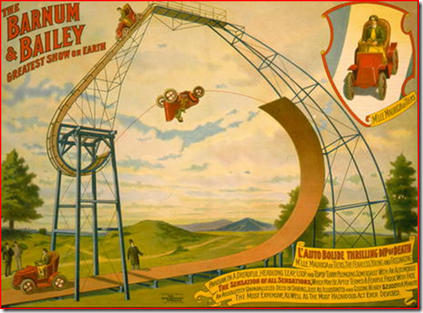Published Part of Decision Holds That Order Taxing Costs Allowable After An Appeal Awards Costs Is Itself an Appealable Order.
Krikorian Premier Theatres, LLC v. Westminster Central, LLC, Case Nos. E047523/E049537 (4th Dist., Div. 2 Mar. 24, 2011) (certified for partial publication) is a wild decision in that a prior appellate reversal completely changed the playing field as far as awards of fees and costs were concerned. Here is what happened before and afterwards.
Above: The Barnum and Bailey greatest show on earth–L’Auto Bolide thrilling dip of death–M’lle Mauricia de Tiers, the fearless, young and fascinating Parisian, in a dreadful, headlong leap, loop and topsy turvy plunging somersault with an automobile. c1905. Library of Congress.
Earlier, plaintiff obtained a $22 million judgment against defendant and was awarded $2.1 million in contractual attorney’s fees. Defendant appealed and got a huge reversal, with the appellate court determining that the lease’s “sole remedy” clause only allowed plaintiff to obtain reimbursement of fairly insubstantial architectural fees of between $7,000-20,000. Defendant happily paid $12,267.22 in architectural fees on remand, making a new trial unnecessary. Defendant claimed costs on appeal totaling $2.6 million (mainly associated with a cash deposit and a later bond to secure the prior unwound $22 million judgment), with the lower court taxing one item amounting to $944,263. Then, in a cruel twist of fate, the trial court determined defendant prevailed under the contractual fees clause and awarded it $3.3 million in attorney’s fees. Yikes!
Each side appealed. The result was an affirmance, except that the taxing of the $944,263 item was reversed. Now we dissect what happened.
In the only published part of the case, the Fourth District, Division 2 found that an order denying a motion to tax costs (following an appellate decision awarding costs) was an immediately appealable order even before a new final judgment was entered by the trial court. There was a split of authority on the issue, but the appellate court engaged in a scholarly survey and decided that such a collateral order was appealable.
The $944,263 taxed cost item was found to be related to posting of fees for bonding purposes through a complex independent LLC equity arrangement by which investors actually ponied in for the cash deposit and were awarded an interest spread between the interest paid by the court and what investors wanted as a return. Interesting reading to see how appellate cash deposits/bondings can be financed when a defendant is facing collection under a large judgment.
The $3.3 million fee award was affirmed in defendant’s favor. The appellate court found that the reversal meant that the fee award fell also, even if the fee award was not separately appealed. (Schaefer Dixon Associates v. Santa Ana Watershed Project Authority, 48 Cal.App.4th 524, 530 n. 1 (1996); Allen v. Smith, 94 Cal.App.4th 1270, 1284 (2002).) Then, the “prevailing party” determination was found to be correct. After all, the real crux issue was whether the lease “sole remedy” provision governed, because only a small amount would be at issue if it did. Winning $12,267.22, which was paid by the defense quickly, was hardly a victory for plaintiff, with the defense achieving its objective in limiting exposure to the architectural fee expenses. (Accord, Silver Creek, LLC v. BlackRock Realty Advisors, Inc., 173 Cal.App.4th 1533, 1536-1540 (2009) [discussed in our May 21, 2009 post] (seller prevailed in obtaining return of $30 million property even though buyer obtained $1.13 million deposit).)
Quite a case–plaintiff went from having a $22 million judgment and $2.1 million fee award to having both evaporate, owing defendant payment of an fee award in its favor to the tune of $3.3 million. Again, wow! This 3-0 decision was authored by Justice Richli.

